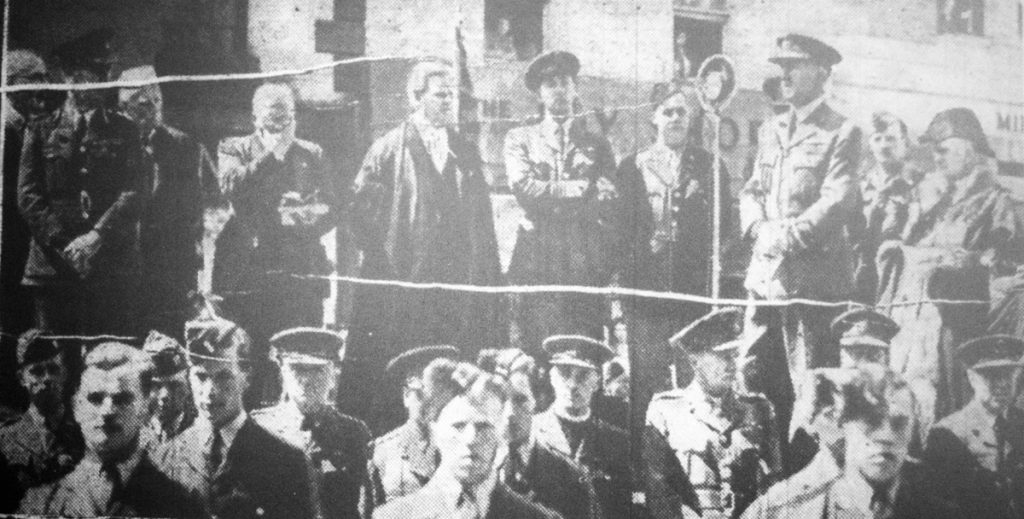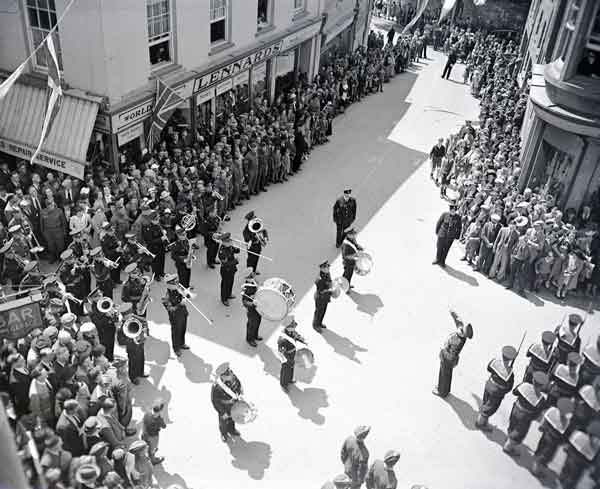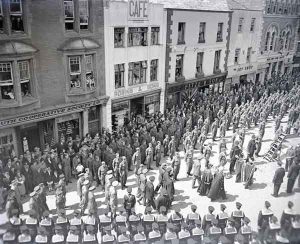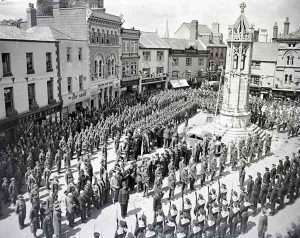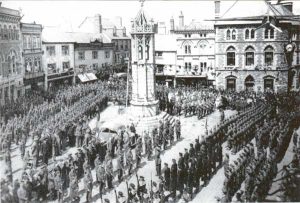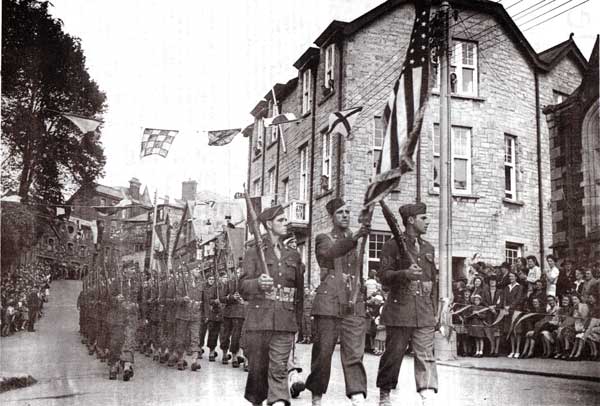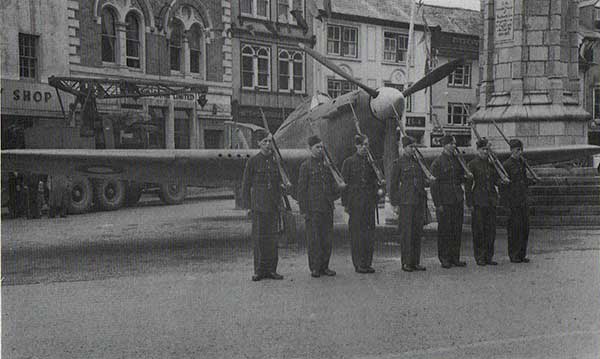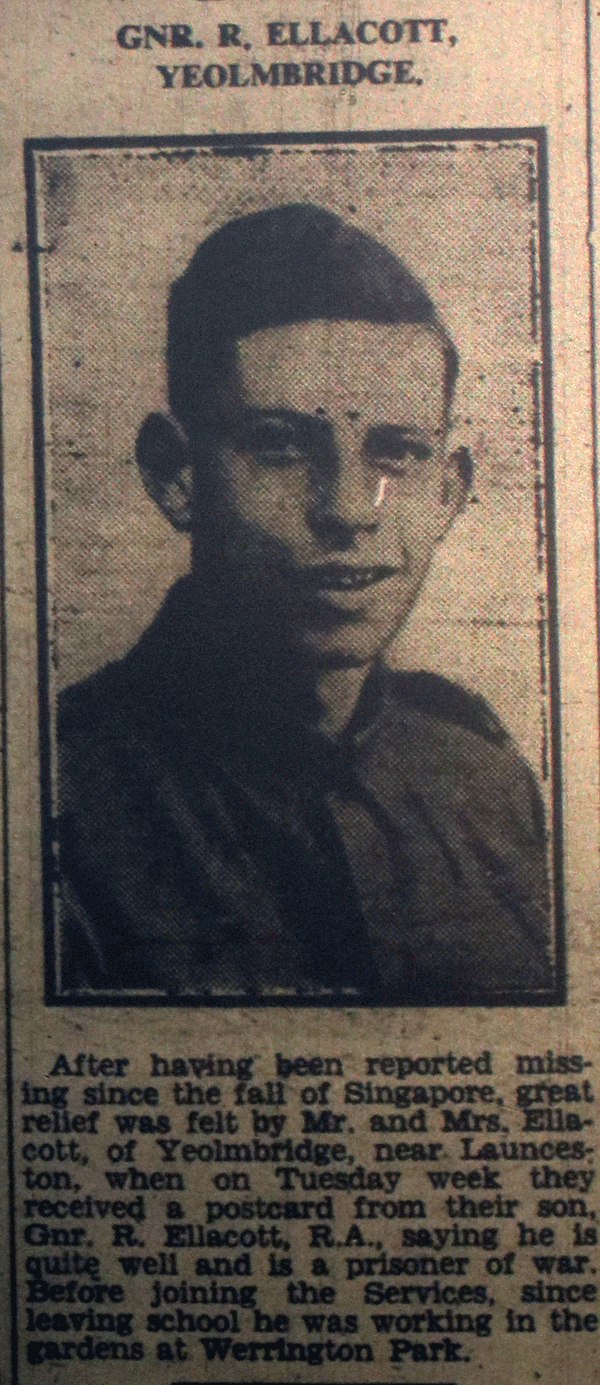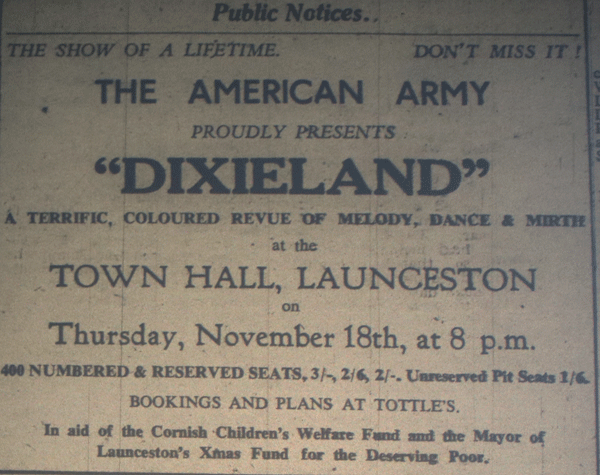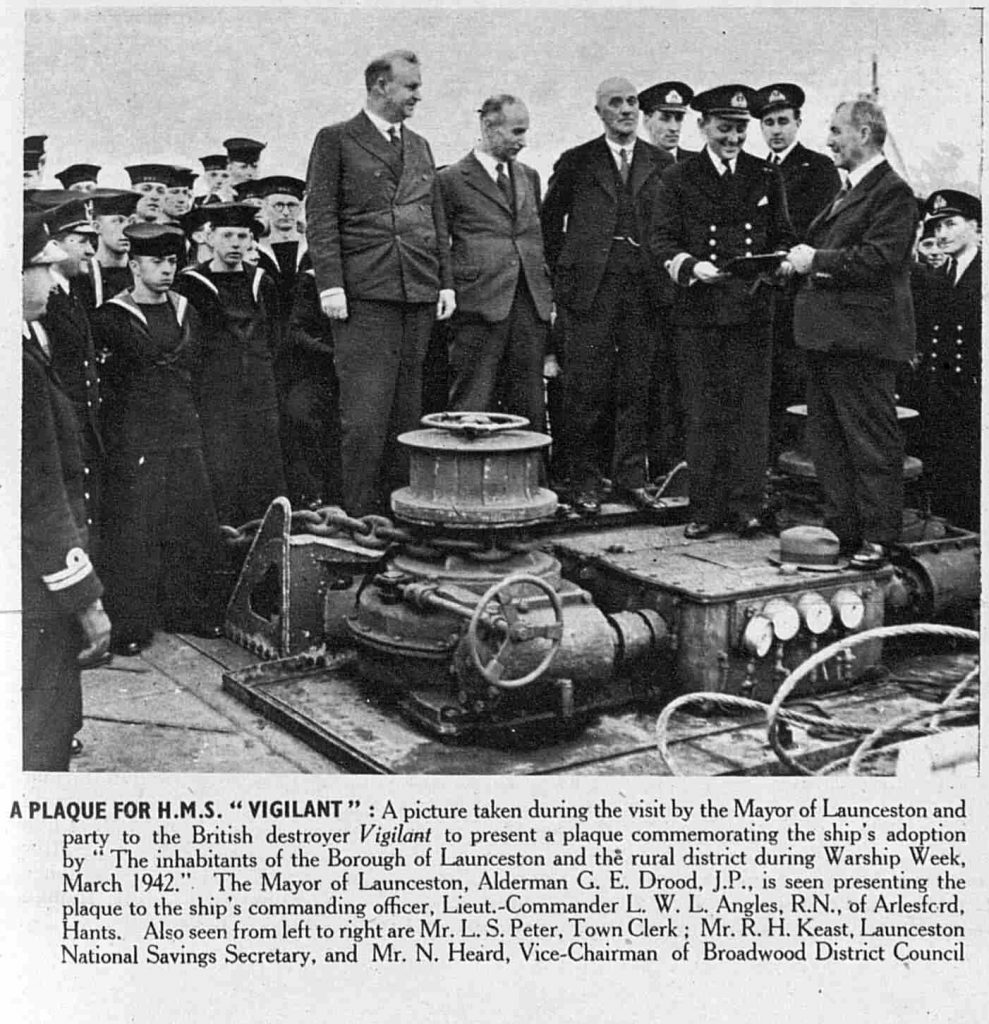.
The year begins with the Casablanca Conference of Allied leaders. Winston Churchill and Franklin D. Roosevelt discuss the eventual invasion of mainland Europe, the impending invasion of Sicily and Italy, and the wisdom of the principle of “unconditional surrender”.
At the first Town Council meeting of the year, the Surveyor reported that during the previous quarter 17 3/4 tons of paper had been salvaged, as well as 32 long pieces of miscellaneous metal, etc., to a total of £129 7s. 6d. It was reported on January 22nd, that Launceston would be holding its ‘Wings for Victory Week’ from June 12th-19th, with two four-engine Liberator bombers and four Spitfires -costing £100,000 – as the target.
In the Soviet Union, the Battle of Stalingrad comes to an end on February 2nd, with the official surrender of the German 6th Army. The German public is informed of this disaster, marking the first time the Nazi government has acknowledged a failure in the war effort.
At the beginning of February it was announced that Major W. R. Prout of the Tamar Company, Launceston had been selected to command the 3rd Castle Battalion Home Guard. He was replaced at Tamar Company by Captain Horrell who had been one of the first to join the Home Guard. It was also announced at the same time that due to the close co-operation the existed between the Home Guard and Civil Defence in Launceston, a Home Guard Platoon composed entirely of C.D. personnel had been formed.

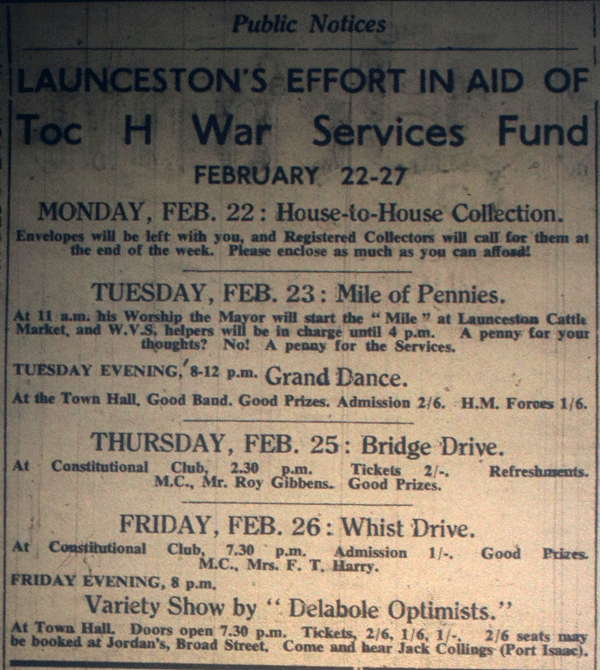
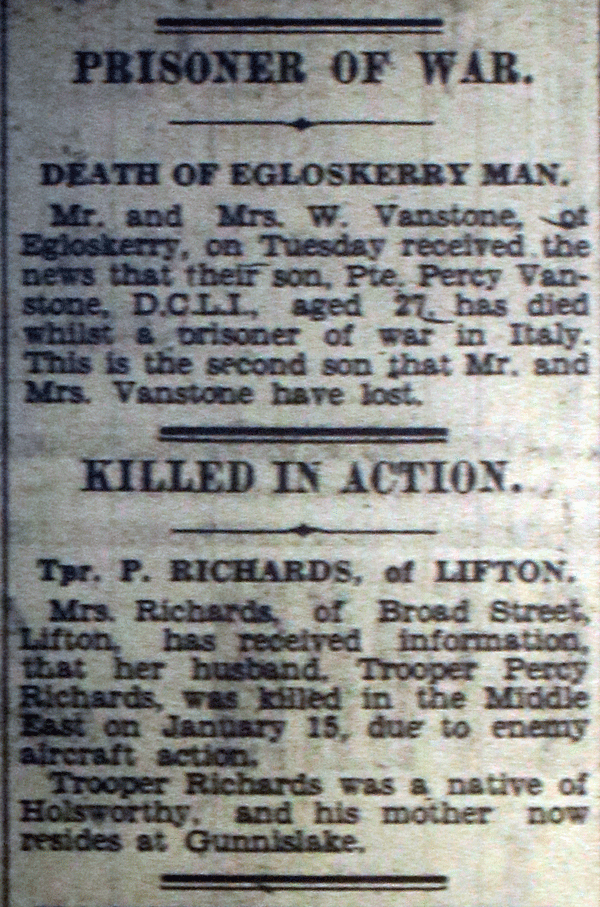
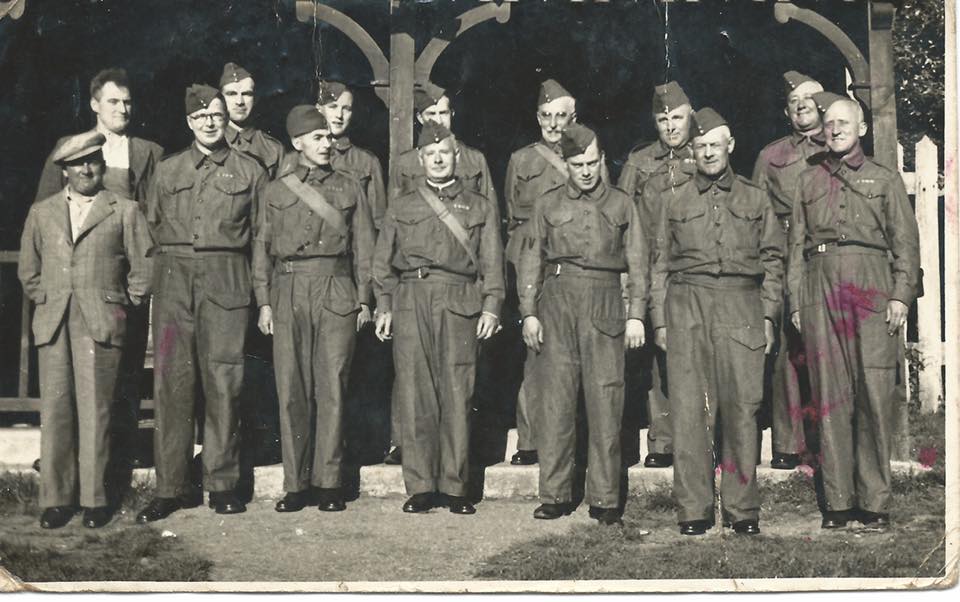
Towards the evening of the second day, the Home Guard were once again fully engaged with the raiders, and this second night were mainly engaged with the Commandos, who commenced their attack from the North-West, and who had come through from a port in Somerset. During the second afternoon, information came in freely from Home Guards in the country areas as well as from the Police and enabled the Battalion Commander to take the necessary measures to cope with the situations. Many districts were combed and swept in their search for the raiders, who were harried and harassed on every hand, and during the night hours a steady flow of prisoners were brought in to be questioned by the Intelligence Officer. The operations were continued into the small hours of the next day until only a small number of commandos were not taken free. The exercise was mainly for the benefit of the Commando Troops, who in this particular case were not allowed to use any transport, and who had orders not to use roads and villages. One of the points to come out of the exercise was the amount of information that was provided by the general public. In the debrief that followed one of the captured Commandos commented when brought in, “heaven help Jerry if he comes to Cornwall; you can’t move or breathe without there is a Home Guard waiting to finish you off.” The Brigadier Commander of the Cornwall Coastal Area said of the exercise, “I would like to send a word of congratulations to the Group in general and to the Castle Battalion. In particular on the excellent work done in the recent Commando exercise. It was quite first-rate and all ranks showed splendid keenness.”
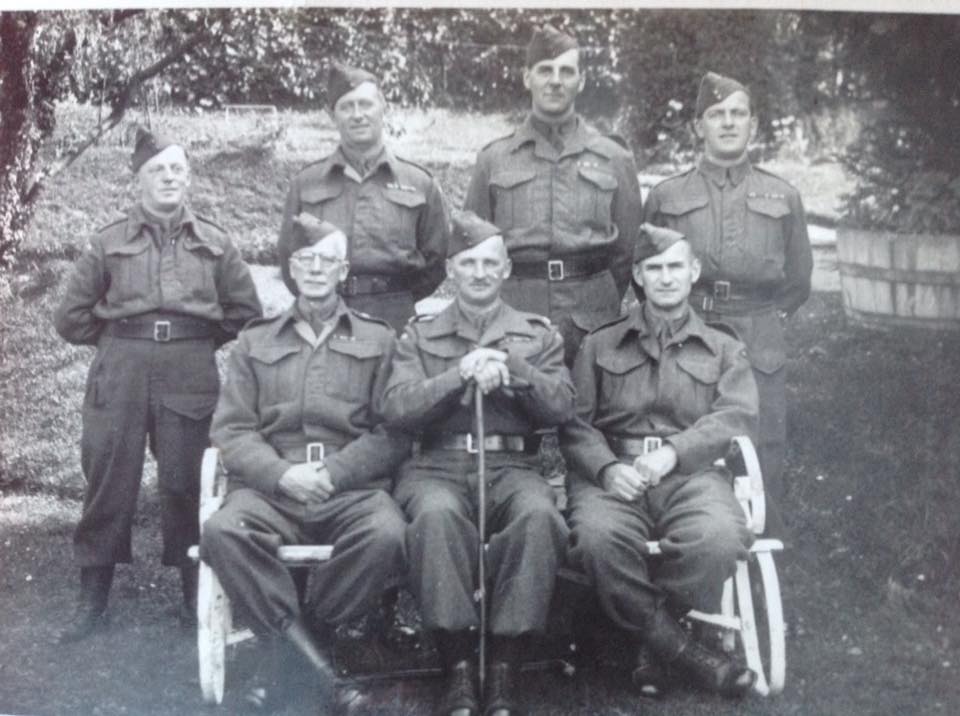
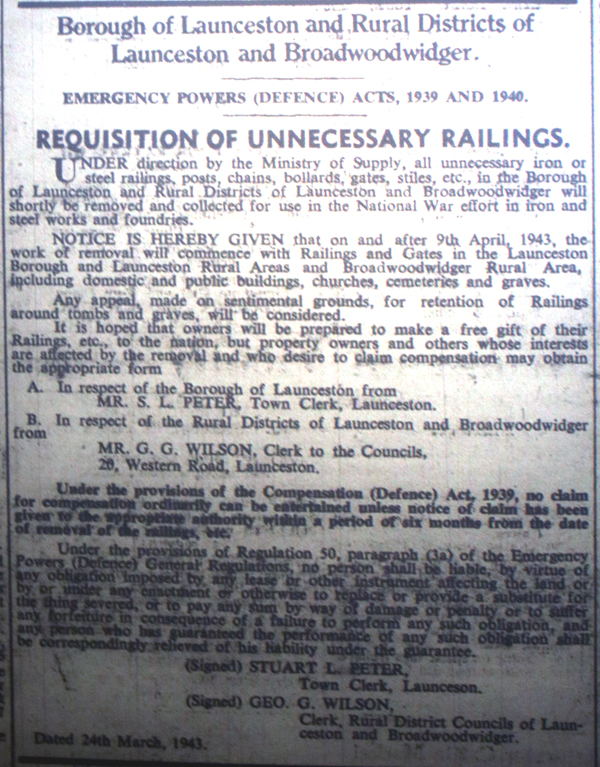
At the end of March 1943, the compulsory removal of un-necessary iron or steel railings began which included those around the Guildhall and St. Mary Magdalene Church. It was stated that in the early part of the war the country had imported iron from abroad at the rate of 500,000 tons a year. This and more had by 1943 to be supplied for ‘our own resources.’ The target by the Ministry of Works was to recover 40,000 tons of scrap metal per week over and above the amount collected through normal trade channels. Up to the end of 1942, some 2,000,000 tons of scrap metal had been collected by the Ministry from various sources. These included steel from bombed buildings (which by 1943, most of the available metal from this source had been cleared), railings, dumps, and metal on the ‘National Survey,’ i.e. derelict mine machinery, disused bridges, obsolete plant, etc. Meanwhile, railings which were one of the most readily accessible sources of supply and which up to the end of 1942 had supplied more than 400,000 tons of valuable metal, were to be collected in a steady flow to keep the foundries going. It was stated that houses all over the country were being ‘de-railed’ at the rate of some 30,000 every week, yielding an average weekly weight of 5,000 tons. At the peak of the collection in London, the railings from the city alone yielded a weekly weight of 8,000 tons. In an article featured in the Cornish and Devon Post of April 3rd, 1943, the process of how the old iron is reused was explained: Light scrap metal was fed into a blast furnace with iron ore, and the molten metal, discharged into comb-shaped channels in a sandbed, becomes pig-iron. At the steel-works, the pig iron is charged in the steel-making furnaces, and in this process railings and other heavy scrap are added to make steel, which is poured into moulds and cooled. The steel ingots are then rolled to form tanks parts, gun forgings, etc. There is some conjecture as to what happened to the iron once it was removed. A fairly common assumption is that the Launceston railings never made it to the furnaces, instead ending up being stockpiled out of sight of the general public. So what did happen? One school says the iron collected was unsuitable and could not be used. This seems unlikely as recycled iron is a key component in the steel industry. Another more likely explanation is that far more iron was collected – over one million tons by September 1944 – than was needed or could be processed. Certainly, the huge underground munitions factory Beaverbook set up at Corsham in Wiltshire ran far below capacity for its short life. It was felt that the cause was a unifying one and of great propaganda value. This is the view of John Farr, author of an article in Picture Postcard Monthly, (‘Who Stole our Gates”, PPM No 371, March 2010). In it he says that only 26% of the ironwork collected was used for munitions and by 1944 much of it was rusting in council depots or railway sidings, with some filtering through to the post-war metal industry. Yet the public was never told this. What is the actual truth, we shall probably never know, and we are left with pre-war images that show the grandness of the railings that once graced two iconic Launceston buildings.
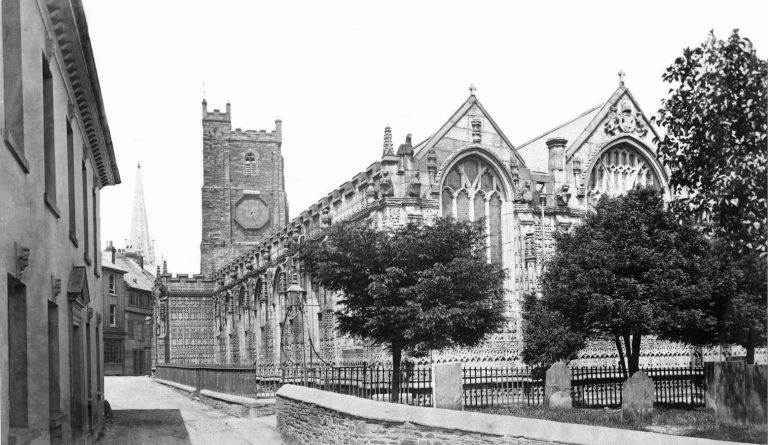
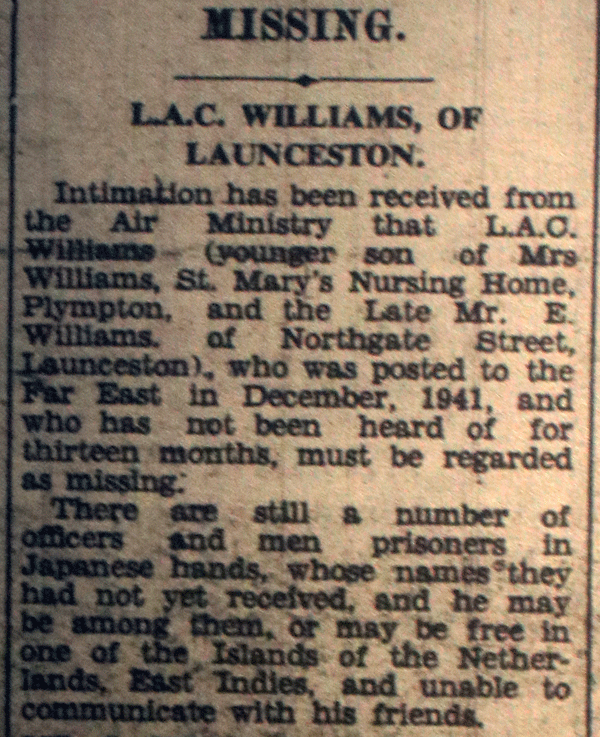
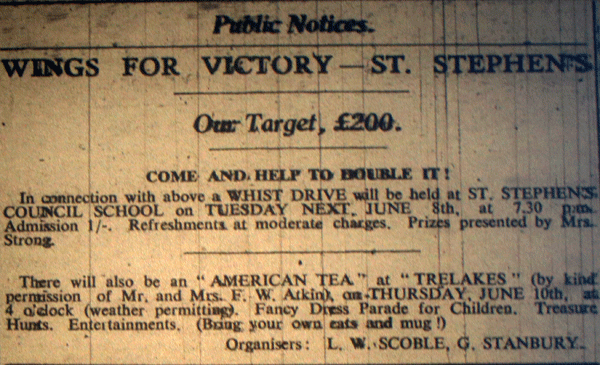
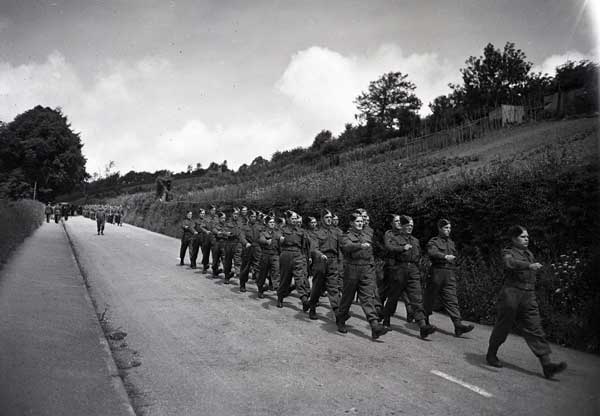
The official opening of the Launceston Wings for Victory Week was performed by Air Marshall Sir Philip Babington on Saturday, June 12th, in the Town Square. A target of £1000,000 was set. The streets were packed to witness what was called an ‘imposing procession’ ably marshalled by Lieutenant Colonel W. R. Prout. The procession consisted of R.A.F. Scout Cars, Royal Navy Band, Royal Naval Contingent, Norwegian Naval Unit, W.R.N.S, American Units, L/Fusiliers Band, Royal Artillery (Searchlights), Army Units, A.T.S., Home Guard, Army Cadets, D.C.L.I. Band, R.A.F. (Davidstow Unit), R.A.F. (Broomhill Unit), W.A.A.F., A.T.C., Royal Observer Corps, N.F.S., St. John Ambulance, Red Cross, Civil Nursing Reserve, R.A. Band, Civil Defence, Land Army, Forestry, Scouts, Guides. Assembling at Roydon Road, the procession marched via Dockacre Road, Tavistock Road and Race Hill to the Square, where the opening ceremony was performed.
Sir Philip Babington was supported by Mr P. G. Heppingstall (South-Western Reginal Representative of the National Committee). The speakers were introduced by the Mayor who stared by saying that they meet under more favourable conditions than the previous two occasions. They were opening their Week that day with the full confidence that the target would be reached. The challenge they had received from Holsworthy had been accepted and their rivals would be beaten, and Bude, he said, would have to look to their laurels. There was a feeling in the town and district that it could be done, and he was sure it would be. Introducing the Air Marshal, the Mayor said Babington was almost a family name in both town and country, and he thought it was largely through the good offices of Captain Babington that they had his brother there that day to perform the opening ceremony.
The Air Marshal said the country was doing a good job of war work and, although not a farmer, on his way down by air the previous day it was clear that the country was being well farmed. Quite apart from that he knew that they had been lending money to the country quite steadily, and in particular they had done well in the two special Weeks. Now they were going to have a new sort of drive they could turn their attention to the Air Force. In the past they had supported the other Services, which was quite natural, seeing that they had an old and famous Regiment, and they had always been sending men to sea. There were several reasons said the Air Marshal, why they should respond generously to the appeal now. The first was production. Hitler had forced the whole of Europe to produce war weapons for the Nazis, and we here must out-produce Europe. The more we could produce this side of the Atlantic the less there would be to bring over and the less risk there would be of losing any. We had to learn not to be too parochial. We had got to help the Americans to finish off the war in the Pacific and put the Japanese where they belonged – in Japan. Americans came over here in considerable numbers long before the U.S.A. came into the war, and the American Eagle Squadron served us magnificently, and we owed them a lot of gratitude for being the forerunners of the great forces now coming over. The second point was that airpower was one of the keys to victory. The campaign in North Africa was not won by air power alone, but by all the Services co-operating magnificently, and without airpower, it would have been a very difficult task. They were pulling together, and we could pull together in lending money. The third reason why we should respond generously was the debt that we all owed to those people to whom the Prime Minister had referred as being so few at the time of the Battle of Britain. That was a debt we could never repay, but we could at least make a gesture towards repayment by giving up every penny we could spare. Whatever history write about that battle there was one thing which would stand forever; the Battle of Britain saved us from losing the war. At that time we were practically alone in the war against Germany and we were in a bad way, but thanks to the Air Force, largely, and other Services, we managed to pull out. During the Battle of Britain was the only occasion when the Italians came over, and everyone was shot down. That was the only time they were over and it would probably be the only time. Explaining that the money invested would be well spent, Sir Philip spoke of the great damage the Air Force had inflicted and said the target area attacked, with the aid of our Allies, was ever widening and taking some of the load off Russia who had borne the brunt of the fighting. Only the previous night they had heard of another reverse for Mussolini. The bombing was increasing and the Germans were beginning to squeal, and we hoped they would be made to squeal a great deal louder. The Germans had short memories and did not seem to remember that they started the bombing. Finally, said the Air Marshall, we in this country had suffered a good deal during the war, but there were a great many people in Europe who had suffered a great deal more, and 10 representatives of those countries were with them that day. The more money we could put into Savings the quicker should we be able to end the war, and he was sure they would put in as much as they possibly could.
Mr Heppingstall gave statistics showing the great amount contributed by the small savers, and this week they had the opportunity of showing their gratitude. On behalf of the National Committee, Mr Heppingstall than extended a most sincere welcome to the troops from America present that afternoon. No army staying in this country was more welcome than the American Army, he said, and we were pleased to have their representatives with us. “These lads have come a long way; let the people of Launceston show them that you are behind them.” The Commanding Officer of the American troops, replying, said it was a pleasure for him as a representative of the U.S. Army and an honour to be allowed to participate in that ceremony. It was fitting and proper that they should do this, because they felt that they were a part of the community, especially after the warm welcome they had received. It was in this spirit of friendship and co-operation that they were so successfully joined together in this great struggle today. “The fight to the finish will be carried through by the untiring efforts of your people and ours, and the Wings for Victory today will be the Wings of Peace for tomorrow,” he concluded amid applause. After all the other speakers addressed the crowd, the procession then returned to the Guildhall Square, the Mayor’s procession being headed by the Band of H.M.S. Raleigh, where the salute at the march past was taken by the Air Marshal, and the Bugle Band of the Royal Artillery beat ‘The Retreat.’
At the Town Council’s monthly meeting held on July 19th, it was announced that owing to the difficulty in recruiting a full-time staff, the British Restaurant in Northgate Street may have to close. The Town Clerk explained that the British Restaurant Committee met on the previous Friday in consequence of having received the resignation of four members of the staff. He said that since the restaurant had opened there had been a continually changing staff, some of the members of whom had children to look after, and they had asked to be released in order that they could give more attention to the children at home. The matter reached the stage on the Friday, said the Town Clerk, when, unless they could get a full time staff, it was considered the restaurant would have to be closed. Some discussion then took place regarding the rate of pay with Alderman Harvey saying that he’d heard a lot of complaint as to the rate of pay. If they expected women to work for 10d. an hour in these times he thought it was time they did close it, he said. Replying, the Mayor said that the rate of pay had been increased from 10d. to 1s. It was agreed to await for a meeting to be held with the Ministry of Food, to see if they were able to do anything to help. The crisis was soon alleviated when new staff were found and by September the restaurant was running smoothly again.
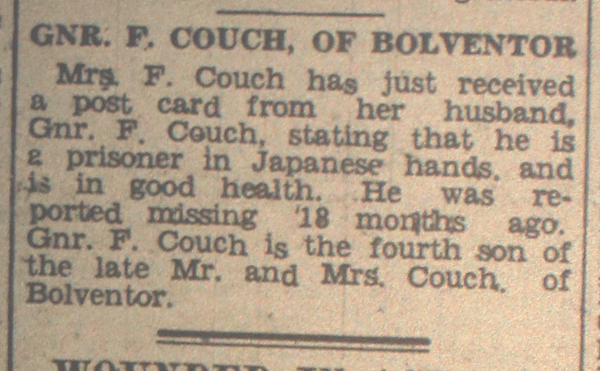
On September 3rd, a secret Italian Armistice is signed and Italy drops out of the war. Mainland Italy is invaded when the British XXIII Corps lands at Reggio Calabria. Five days later Eisenhower publicly announces the surrender of Italy to the Allies. The Germans enact Operation Achse, the disarmament of Italian armed forces. On September 11th, the Government announced that deferments granted for men in munitions and other industries who were born in or after 1915, 1910, or 1905, as the case may be, must be brought to an end. Mussolini is rescued by aircraft from mountaintop captivity by German SS troops led by Otto Skorzeny. Mussolini is then set up by Hitler, who remains loyal to his old friend, as the head of the puppet “Italian Social Republic,’ on September 12th.
The policy of segregation that existed in the USA was continued with here in the UK, with the Black soldiers being placed in different buildings to the White soldiers at Pennygillam. This segregation continued within the town as an infamous incident one Saturday night on September 25th, 1943 proved. Five black GI’s from an ordnance unit were told to return to camp by MP’s when it was found that they did not have passes, forcing them to miss the local dance. Being unhappy at this request they became quite belligerent with one threatening an MP with what’s in his pocket. But eventually, they did leave. However, the next night eighteen black soldiers entered the lounge bar of a pub in the town (believed to be the Castle Temperance Hotel in High Street). White soldiers were drinking there too and the barman told the black soldiers that they couldn’t be served in that part of the house. The black GI’s clearly took umbrage at this as although they reluctantly left, they returned back into the town later on this time armed with Tommy guns, rifles and bayonets.
Two MP’s challenged them and ordered them to return to their barracks which the black GI’s ignored and began to open fire causing mayhem. Bullets rang around and people ran in all directions. The two MP’s ended up with wounds to their legs. Fourteen black GI’s were arrested and court marshalled in Paignton with the charge of mutiny and attempted murder. Sentences of either death or life imprisonment were handed out after a three-day hearing. It is not known if the death sentences were carried out, but many were still serving time some years after the war.
Sid Broad, who then worked for Truscott’s (opposite Town Hall) at the time, found one of the Tommy guns used in the gunfight the following Monday morning hidden in a gutter above the back door to the garage (they used to keep a spare door key in the gutter, so whoever got to work first could open up). Bullets marks littered the town with Lloyds Bank in square wearing a couple and for years after a thick glass window of the Orange Tea Rooms in Church Street bore a bullet hole.
David Thomas remembers “ I was only twelve when the yanks came to Lanson but I had five sisters all older than me and the yanks used to swarm around our house like bees around honey. Father loved it because they never came calling without bringing The Chesterfield cigarette or Lucky Strike and some candy for me and me younger brother, then every so often they would arrange a party at Scarne camp where we would get ice cream. Imagine that lovely ice cream what a luxury.” Ann Caddick can also remember the Scarne parties “I remember going to a party at the Pennygillam camp given by the Americans. We had to take a spoon with us to eat the ice cream – a real treat for us.” The late Terry Duke, who was about 10 years old when the Americans came to the town, remembers the black GI’s singing at St. Stephens Church and “boy could they sing” he said. He also remembers St. Stephens Church Hall being commandeered and used as the American Post Office. Terry’s father won the Military Medal during the Normandy landings in 1945. Martin Wills, who lived at Hessacott Farm on the Cornwall, Devon border, recalls on the BBC’s WW2 People’s War website ‘Now Launceston College was interesting for other reasons, in 1943 the Americans arrived, there were 2 camps at Launceston, one each side the College. One White, one Black. We lived with the Yanks for nearly 2 years. The US troops would take their trucks, jeeps & other vehicles down to Newport which is the lower part of the town to wash the vehicles in the River Kensey. During that time a tank transporter with a Sherman tank on board was stuck in Southgate Arch, the gouges in the walls can still be seen today. The US also had a Military hospital in the Castle Grounds that is where I saw Joe Louis the boxer who was visiting the troops. The Blacks & Whites had a `firefight` in the town one night, there were bullet holes through the shop windows, Hicks drapers shop and Mules the hairdresser as well as chips off the War Memorial.
In 1943 the whole area around Launceston was an ammunition dump. Strips of farmland adjoining public roads were taken over by the military. Fences were erected to contain the farm animals, numerous gaps were made in the Cornish hedges and small `half-round` shelters were erected. these were filled with all manner of ammunition. shells by the 1`000`s, bombs etc, etc. The interesting thing was that none of any of these dumps were guarded.‘ ‘Copyright © Martin Wills WW2 People’s War is an online archive of wartime memories contributed by members of the public and gathered by the BBC. The archive can be found at bbc.co.uk/ww2peopleswar‘
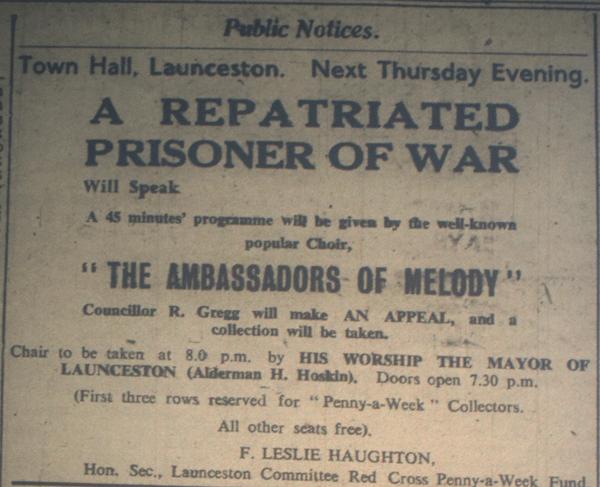
It was announced during the October meeting of the Town Council that H.M.S. Vigilant had been officially adopted by the town and that direct communication could now be established through the G.P.O., London. The Mayor stated that he had received a letter from the Captain who had pointed out that he might not be able to get in touch with the town with regard to the plaque to be presented to the ship. The Mayor said he did not know what the feeling of the Council was, but many towns adopted ships, especially in Cornwall, had sent comforts to the crew. Councillor Fulford observed that what the Mayor could do was to send a telegram from the Council to the Master of the ship and the crew, wishing them god-speed. On October 13th, Italy declares war on Germany.
A crowded Town Hall on Tuesday, November 1st, saw the presentation of plaques in commemoration of ‘Wings for Victory’ week, and also the presentation of log books to the Air Ministry. The presentations took place in an interval in a concert given by a military band of the United States Army. Group Captain K. Pickles after a short speech, presented a plaque to the Mayor for Launceston Town Council; to Mr A. Sloman (chairman) for Launceston Rural Council; and to Mr N. Heard (vice-chairman) for Broadwoodwidger Rural District Council. In return the Town Clerk, Mr Stuart Peter, on behalf of Launceston Town Council, then presented to Group Captain Pickles for the Air Ministry, log books to be used in the aircraft provided by the town and district. Mr Peter explained that the log books would be carried by the aircraft allotted to the area, and all the war activities would be recorded in them. When completed they would be returned to the town and become one of the treasures in the Borough archives. Similar log books were then presented by the two respective Rural Council’s. Mr Rodney Keast (general secretary) made a strong appeal for more people to join the Savings Groups. He gave figures showing the comparatively small number who were regular savers in the town and district, and said he was sure they could improve on that, but he raised a round of applause when he announced that since records had been kept the amount they had invested for the town had reached £1,096,000. A collection was then made to provide comforts for the crew of Launceston’s newly adopted ship, H.M.S. Vigilant. A total of £21 11s. 9d. was raised.
At the Mayor choosing ceremony held at the end of November, Alderman G. Trood was elected thus relieving Alderman H. Hoskin, who had served for five consecutive years. On November 15th, the Allied Expeditionary Force for the invasion of Europe is officially formed. The Cairo Conference: US President Franklin D. Roosevelt, British Prime Minister Winston Churchill, and ROC leader Chiang Kai-shek meet in Cairo, Egypt, to discuss ways to defeat Japan begins on November 22nd, lasting for four days. This was followed on the 28th by the Tehran Conference. US President Franklin D. Roosevelt, British Prime Minister Winston Churchill and Soviet leader Joseph Stalin meet in Tehran to discuss war strategy; (on November 30th, they establish an agreement concerning a planned June 1944 invasion of Europe codenamed Operation Overlord). Stalin, at last, has the promise he has been waiting for.
An appeal was launched by the Mayor, Alderman Trood, at the end of November, to raise funds for the Salvation Army in their work amongst the men and women of the Forces. The Army were operating in all the theatres of the war, with 1,300 Salvation Army Clubs serving food and rest centres. At the beginning of December, it was announced that men born between January 1st, 1926, and March 31st, 1926, were to register for military service. The Surveyor reported that during the quarter of October to December the value of salvage disposed of was £69 15s. 11d., as compared with £109 7s. 3d. for the previous quarter. The apparent drop was due to the fact that they were awaiting the collection of paper and textiles of which they had an approximate value of £60 in stock.
Visits: 166


